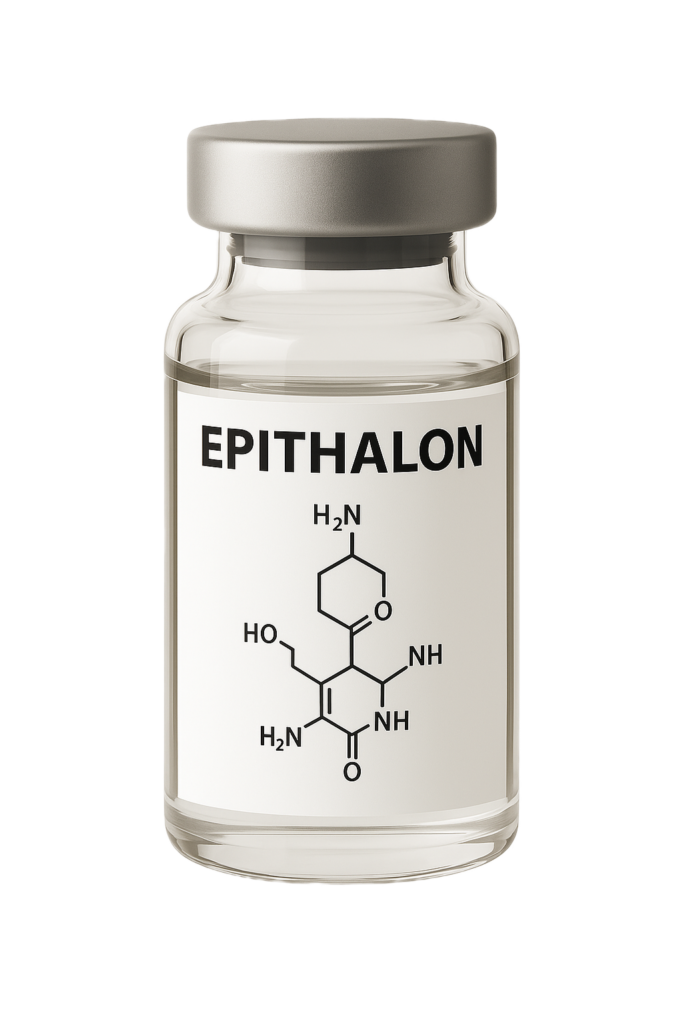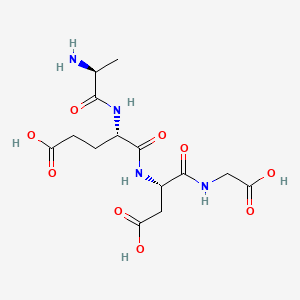Epithalon
Telomere elongation
Antioxidant effects
Immune system modulation
Neuroprotective effects
Telomere lengthening and cognitive support.
Mechanism of action
Telomere lengthening and cognitive support.
Notable Studies
In vitro studies have shown that Epithalon can induce telomerase activity and elongate telomeres in human somatic cells.
Animal studies suggest that Epithalon may increase lifespan and reduce the incidence of spontaneous tumors.
Clinical studies indicate potential benefits in restoring melatonin secretion and improving circadian rhythms in elderly individuals.
Risk Associated
While Epithalon has shown promise in various studies, potential risks include:
Unknown long-term effects due to limited large-scale human trials
Possible side effects such as fatigue and headaches
Not approved by regulatory agencies for human use
Dosage
Common research dosages include:
10 mg administered subcutaneously daily for 10 days, repeated every 6 months
Alternative protocols may vary based on research objectives
External link


Epithalon
Telomere elongation
Antioxidant effects
Immune system modulation
Neuroprotective effects
Mechanism of action
Telomere lengthening and cognitive support.
Risk
Associated
While Epithalon has shown promise in various studies, potential risks include:
Unknown long-term effects due to limited large-scale human trials
Possible side effects such as fatigue and headaches
Not approved by regulatory agencies for human use
Notable Studies
In vitro studies have shown that Epithalon can induce telomerase activity and elongate telomeres in human somatic cells.
Animal studies suggest that Epithalon may increase lifespan and reduce the incidence of spontaneous tumors.
Clinical studies indicate potential benefits in restoring melatonin secretion and improving circadian rhythms in elderly individuals.
Dosage
Common research dosages include:
10 mg administered subcutaneously daily for 10 days, repeated every 6 months
Alternative protocols may vary based on research objectives
External link
Epithalon
Telomere elongation
Antioxidant effects
Immune system modulation
Neuroprotective effects
Mechanism of action
Telomere lengthening and cognitive support.

Risk
Associated
While Epithalon has shown promise in various studies, potential risks include:
Unknown long-term effects due to limited large-scale human trials
Possible side effects such as fatigue and headaches
Not approved by regulatory agencies for human use
Notable Studies
In vitro studies have shown that Epithalon can induce telomerase activity and elongate telomeres in human somatic cells.
Animal studies suggest that Epithalon may increase lifespan and reduce the incidence of spontaneous tumors.
Clinical studies indicate potential benefits in restoring melatonin secretion and improving circadian rhythms in elderly individuals.
Dosage
Common research dosages include:
10 mg administered subcutaneously daily for 10 days, repeated every 6 months
Alternative protocols may vary based on research objectives
External link
-
Khavinson VKh, Bondarev IE, Butyugov AA. Epithalon peptide induces telomerase activity and telomere elongation in human somatic cells. Bull Exp Biol Med. 2003;135(6):590–592.
-
Khavinson VKh, Kuznik BI, Tarnovskaia SI, Lin’kova NS. Peptides and CCL11 and HMGB1 as molecular markers of aging: literature review and own data. Adv Gerontol. 2014;27(3):399–406.
-
Kozina LS, Arutjunyan AV, Khavinson VKh. Antioxidant properties of geroprotective peptides of the pineal gland. Arch Gerontol Geriatr.
-
Khavinson VKh, Lin’kova NS. Morphofunctional and molecular bases of pineal gland aging. Fiziol Cheloveka.
-
Anisimov VN, Khavinson VKh. The use of peptide bioregulators for cancer prevention: results of 35 years of research experience and perspectives. Vopr Onkol.
-
Khavinson VKh. Peptides and aging. Neuro Endocrinol Lett.
-
Vinogradova IA, Bukalev AV, Zabezhinski MA, Semenchenko AV, Khavinson VKh. Effect of Ala-Glu-Asp-Gly peptide on life span and development of spontaneous tumors in female rats exposed to different illumination regimes. Bull Exp Biol Med.